8 Essential Skills Every CNC Operator Should Have

Are you interested in becoming a CNC operator in the aviation industry? Or are you a seasoned operator looking to improve your skills and stay competitive in the field?
Regardless of your experience level, there are essential skills that every CNC operator in aviation must possess to ensure success in this dynamic and challenging industry. From technical expertise to soft skills, this blog will outline the eight essential skills every CNC operator should have, as well as practical tips for developing and refining these skills.
Whether you’re just starting or looking to take your career to the next level, read on to discover what it takes to excel as a CNC operator in aviation.
1. Technical Skills
Technical skills are one of the most important skills that every CNC operator should have. These skills are necessary for effectively operating and maintaining CNC machines, which are critical in the aviation industry. CNC operators must have knowledge and expertise in various technical areas, such as computer programming, machine maintenance, and precision measurement.
Here are some of the technical skills that are essential for CNC operators in aviation:
Knowledge of programming languages such as G-code and M-code
Proficiency in CAD/CAM software for designing and modeling parts
Ability to read and interpret technical drawings and schematics
Familiarity with various cutting tools, materials, and machining techniques
Understanding of metrology and precision measurement tools such as micrometers and calipers
Knowledge of machine maintenance and troubleshooting techniques
Ability to perform routine maintenance tasks such as lubrication, cleaning, and tool changing
Understanding of safety procedures and regulations related to CNC machines.
Technical skills are the backbone of successful CNC operations in aviation, enabling the production of top-notch aerospace components. Without these skills, the safe and efficient operation of CNC machines would be at risk, which could lead to inferior products and potential safety hazards. Therefore, it’s vital for every CNC operator in aviation to continuously develop and hone their technical skills to stay ahead of the curve in this ever-evolving industry.
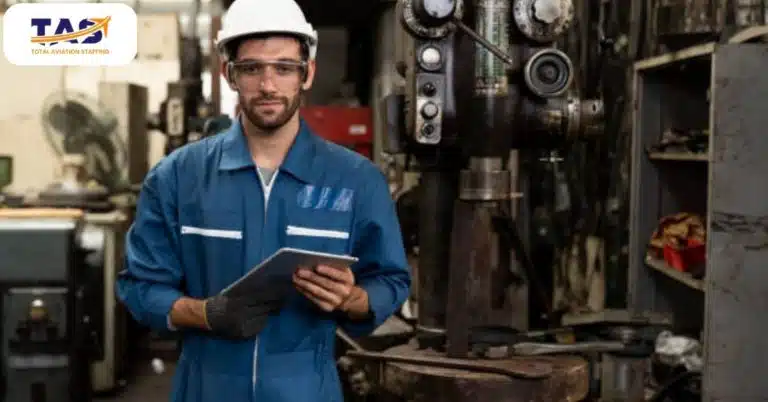
2. Math Skills
In the world of aviation, CNC operators need to be mathematically sharp to ensure the accuracy and precision of the aerospace components they produce. As the aviation industry continues to evolve and demands greater intricacy in its components, mathematical skills are an essential requirement for CNC operators.
Here are some of the key mathematical skills that every CNC operator should possess:
Basic arithmetic operations such as addition, subtraction, multiplication, and division
Ability to work with decimals, fractions, and percentages
Knowledge of trigonometry and geometry for interpreting blueprints and creating tool paths
Familiarity with algebraic formulas and equations for calculating speeds, feeds, and other variables
A solid grasp of mathematical principles and applications is crucial for CNC operators in aviation to produce high-quality aerospace components with precision and accuracy. As technology advances and aerospace components become increasingly complex, honing math skills is essential for staying ahead in the industry and maintaining safety and efficiency in CNC operations.

3. Attention to Detail
In the high-stakes world of aviation, CNC operators play a crucial role in producing top-quality aerospace components. One of the most critical skills they must possess is unwavering attention to detail. A single mistake can lead to disastrous consequences, making precision and accuracy an absolute must-have in this field.
Reasons why it is an important skill:
CNC operators must closely follow blueprints and specifications to ensure that every part is manufactured with extreme accuracy.
Any deviation from the desired dimensions or tolerances can compromise the integrity of the component and jeopardize the safety of the aircraft.
Attention to detail also extends to the maintenance and inspection of CNC machines to prevent malfunctions or breakdowns.
Attention to detail is not just a skill, it’s a mindset that sets apart the best CNC operators. By prioritizing precision and maintaining a keen eye for detail, these operators play a vital role in ensuring the safety and reliability of aerospace components.
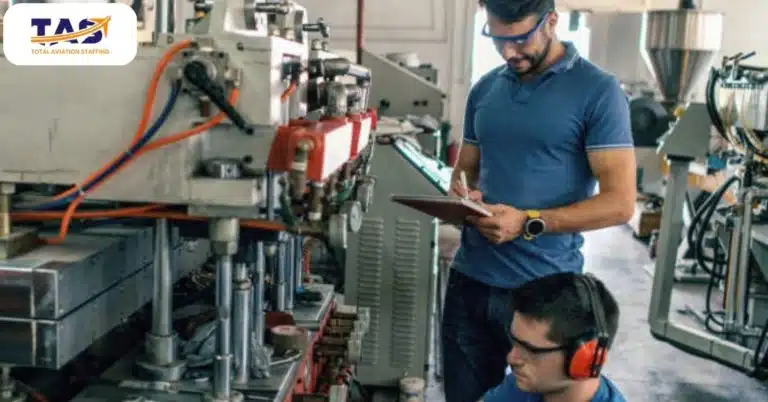
4. Problem-Solving Skills
CNC operators in aviation must possess excellent problem-solving skills to tackle the intricate challenges that arise in the production of aerospace components. With the ability to identify, analyze, and solve problems, a CNC operator can ensure the smooth and efficient operation of CNC machines, guaranteeing high-quality output.
Some key aspects of problem-solving skills that are crucial for CNC operators include:
Analyzing and interpreting technical drawings and specifications.
Identifying and troubleshooting issues with CNC machines and software.
Collaborating with engineers and other team members to develop and implement solutions.
With problem-solving skills as one of their key assets, CNC operators in aviation are invaluable in addressing the complex challenges of aerospace production. By staying vigilant and proactive in their approach to problem-solving, these operators play a crucial role in ensuring the continued success and advancement of the aerospace industry.
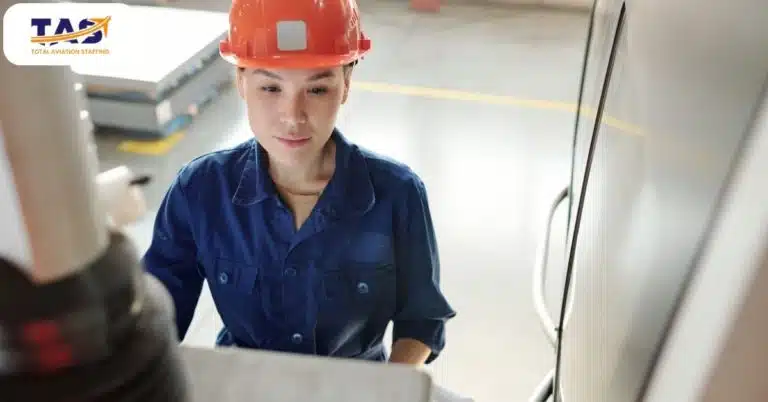
5. Communication Skills
Clear and effective communication is a critical skill for CNC operators in aviation. CNC operators must work closely with engineers, designers, and other operators to ensure that every aspect of production is completed accurately and efficiently.
They must be able to communicate effectively and efficiently with their team members to avoid costly errors and delays. Good communication skills also enable CNC operators to convey complex technical information to colleagues and customers in a clear and understandable manner.
Effective communication is essential to maintaining a safe and productive workplace, and CNC operators must make it a top priority to continually develop and refine their communication skills.
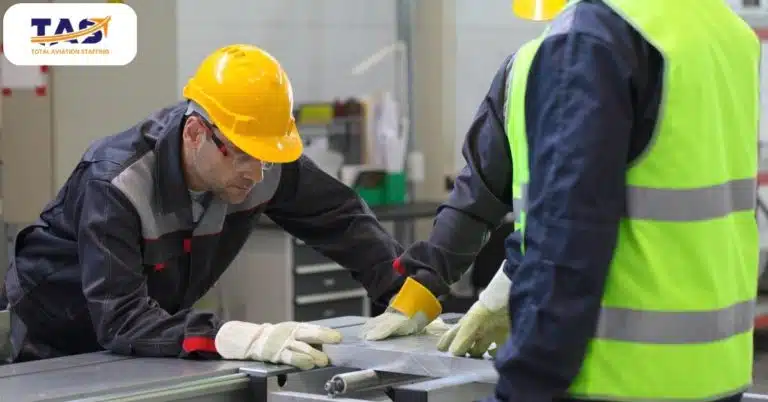
6. Time Management Skills
Time management skills are a critical asset for CNC operators in aviation, where the efficient use of time is essential to meeting production targets and deadlines.
A CNC operator with strong time management skills can effectively prioritize tasks, manage their workload, and optimize machine utilization, ensuring that all processes are completed within the allotted time frame. This skill also helps in identifying and minimizing delays, leading to increased productivity, cost-effectiveness, and customer satisfaction.
In the fast-paced and demanding aerospace industry, the ability to manage time effectively is crucial for success.

7. Ability to Work Under Pressure
CNC operators in aviation must work under pressure and tight deadlines while maintaining accuracy and precision in their work. Unexpected issues can arise, requiring operators to remain calm and focused to find solutions.
The ability to work well under pressure is crucial for success in the aerospace production process and the safety of all involved. It demands strong decision-making skills, effective task prioritization, and the ability to stay focused and productive in stressful situations.
Operators who can work well under pressure are highly valued and seen as an asset to any organization. Therefore, developing and maintaining this skill should be a top priority for every CNC operator in aviation.

8. Adaptability
As the aviation industry is constantly changing, CNC operators must possess adaptability skills to overcome new challenges and stay competitive. Adaptable CNC operators are highly valued as they can improve efficiency and reduce costs while helping organizations achieve success in the dynamic industry.
To evolve their adaptability skills, CNC operators can take the following steps:
Continuously learn and stay updated with the latest technology and industry trends.
Seek out new experiences and challenges to broaden their skill set.
Be open to feedback and use it to improve performance.
Embrace change and be willing to adjust their approach to tasks and projects.
Build strong relationships with colleagues and superiors to foster a collaborative and supportive work environment.
Develop a growth mindset that prioritizes learning and personal development.
Take initiative to solve problems and identify areas for improvement.
Participate in training programs and seek out opportunities for professional development.
By prioritizing adaptability and taking steps to continuously evolve their skills, CNC operators in aviation can position themselves for success in this dynamic industry. As new challenges arise and the industry continues to evolve, those who can adapt quickly and efficiently will be highly valued. With a commitment to learning, growth, and collaboration, CNC operators can continue to contribute to the safety and success of aerospace production.
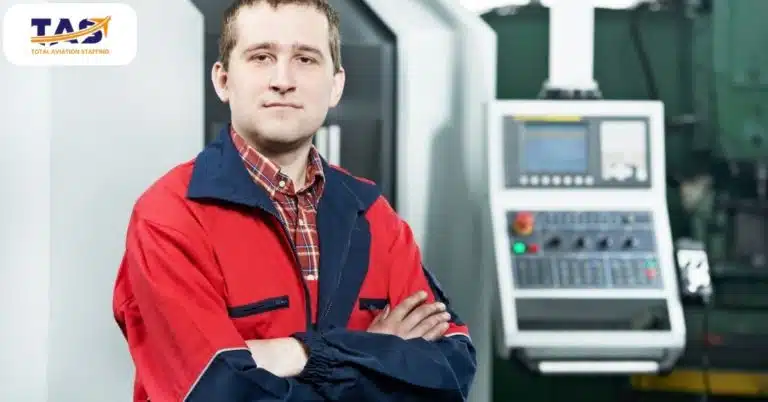
Takeaways
CNC operators in aviation must possess a diverse set of skills to succeed in this challenging and dynamic industry. From technical expertise and attention to detail to problem-solving abilities and adaptability, the eight essential skills discussed in this blog are critical for CNC operators to deliver high-quality, safe, and efficient production of aerospace components. By continually developing and refining these skills, CNC operators can position themselves for success and contribute to the success of their organizations. So, whether you’re a seasoned CNC operator or just starting your career in aviation, these essential skills are worth investing in for a successful and fulfilling career.
Discover how to become a successful CNC operator in the aviation industry! With Total Aviation Staffing, you’ll have the chance to connect with top MROs, OEMs, airlines, aerospace, and charter companies. We’ll help take your career further by connecting you with the best opportunities for success. Learn about essential skills, training programs, and job openings today – and get one step closer to reaching your aviation career goals! Get ready for an unforgettable journey with Total Aviation Staffing. Search for jobs now and skyrocket your success!
